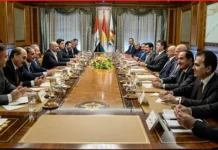An Economic Expert Told NINA: The Deterioration Of The International Security Situation Will Negatively Impact The Global Economy In General And The Iraqi Economy In Particular.
Friday, September 12, 2025 | Economic Number of readings: 419 Baghdad/ NINA / Economic expert Raad Twaij affirmed that the deterioration of the international security situation will negatively impact the global economy and contribute to the militarization of the global economy and a decline in global growth rates, which will impact the Iraqi economy, which relies primarily on global demand for oil and freedom of transportation.
“The global situation is heading towards polarization, whether as a result of the situation in Europe and the Ukrainian-Russian conflict , reaching the situation in the Middle East and the Arab-Zionist conflict and the brutal attacks of this entity on the region as a whole, in addition to the controversy represented by the imposition of escalating customs tariffs, and its contribution to a new global division between the North and the South, at the top of which is China with the United States of America,”
Tawij said in a statement to the Iraqi National News Agency (NINA). He pointed out that these conditions will contribute to the militarization of the global economy and a decline in global growth rates, which will have an impact on the Iraqi economy, which relies primarily on global demand for oil and freedom of transportation, in addition to allocating a high percentage of resources to defense issues and the militarization of the Iraqi economy.
He continued, “We must accelerate economic development, self-reliance, and reduce economic rentierism and unnecessary imports to reduce the economy’s dependence on the global economy.” https://ninanews.com/Website/News/Details?key=1251440
The Islamic Banks Association Affirms Its Full Support For The Banking Reform Plan.
Baghdad – INA The Iraqi Association of Islamic Banks affirmed its full support for the banking reform plan on Thursday.
In a statement received by the Iraqi News Agency (INA), the association stated, “The Iraqi Association of Islamic Banks affirms its full support for the comprehensive banking reform plan launched by the government in cooperation with the Central Bank of Iraq.
” It explained, “We firmly believe that this plan represents a pivotal and necessary step to enhance the stability of the banking sector in the country and ensure its sustainable growth, in a way that serves the supreme interests of the national economy.”
She added, “This reform initiative aims to enhance transparency, combat financial corruption, and modernize legal and regulatory frameworks to align with global best practices.”
She emphasized that “Islamic banks require members of the association to provide a sustainable and ethical financial model,” affirming that she is “fully prepared to work alongside the Central Bank of Iraq and relevant authorities to achieve the goals of this reform plan.”
The association continued, “We will continue our effective contribution by promoting financial inclusion, supporting economic development, and fully adhering to the instructions and regulations issued by the Central Bank, which will strengthen financial governance and oversight.
We are confident that these joint efforts will pave the way for a prosperous and stable financial future.” https://ina.iq/ar/economie/243142-.html
Banking Reform Enters A Decisive Phase: The Central Bank And Banks Are In A Race Against Time – Urgent
Baghdad Today – Baghdad The Iraqi banking sector is going through a critical phase, where economic and financial considerations intersect with the demands of structural reform that have been postponed for years.
After decades of challenges, and amid international and local pressure to improve the efficiency of the financial system, the reform paper launched by the Central Bank in coordination with an international consulting firm emerged as an attempt to rebuild trust and establish more robust rules for banking operations.
The importance of this issue goes beyond the financial dimension; it extends to the broader institutional context related to the state’s ability to formulate economic stability tools and meet transparency requirements, which in turn are linked to the confidence ofinvestors and international donors.
In this context, economic expert Ahmed Abdul Rabbo, speaking to Baghdad Today, predicted that “the end of September will be the deadline for private banks to sign the final amendments to the reform paper submitted by the Central Bank of Iraq in coordination with Oliver and Iman.”
This timing reflects the Central Bank’s awareness of the country’s need to end the period of hesitation and embark on a clearly defined reform path.
According to institutional estimates, setting a timetable for signing aims to overcome the procrastination that accompanied the first rounds of dialogue with private banks and transform reform from a theoretical idea into a practical commitment.
Adjustments In Response To Market Pressures
Recent developments indicate that the reform was not imposed unilaterally, but rather came after a series of technical discussions with banks.
Abdul Rabbo explained that “the Central Bank has made extensive amendments to the banking reform paper over the past weeks in response to the comments submitted by the banks, noting that it was keen to open an extensive dialogue with Iraqi banks to clarify the technical aspects of the reform paper.”
This clarification reveals a collaborative process that balances reform requirements with market pressures.
According to economic estimates, the central bank’s understanding of banks’ comments reflects its awareness that implementing strict measures without consensus could hinder the banking system’s ability to keep pace with changes.
At the same time, this dialogue seeks to establish the principle of transparency and a commitment to gradualism as a means of ensuring the effectiveness of reform, consistent with similar international experiences in restructuring banking sectors.
Gradual Reform With Privacy In Mind
The discussion is not limited to the form of reform, but also includes its pace. Abdul Rabbo pointed out “the importance of implementing reform mechanisms gradually, taking into account the specificities of Iraq’s economic reality.”
He emphasized the need to adhere to reform in principle, while formulating standards and procedures in a way that enhances confidence in the banking sector and contributes to its development.
According to economic readings, this position reflects the traditional tension between the imperative of rapid openness to international standards and the demands of a local reality characterized by fragility and instability.
Gradualism, financial experts believe, reduces the shocks to small and medium-sized banks and gives the sector sufficient time to adapt to the new regulatory environment.
This makes reform not only a tool for course correction, but also a means of rebuilding the contract between the state and the private financial sector on more sustainable foundations.
The Essence And Dimensions Of The Amendments
The recent amendments raise fundamental questions about the nature of the role private banks will play. Abd Rabbuh explained that the amendments “include extending the capital requirement for banks, reconsidering the ownership structure, and abolishing the foreign partner requirement, thus providing banks with greater flexibility in implementing reforms and strengthening their role in supporting the national economy.”
This change has multiple institutional dimensions.
Extending the capital requirement reduces immediate financial pressure on banks, while reconsidering the ownership structure opens the door to restructuring the relationship between local shareholders and regulatory authorities.
The abolition of the foreign partner requirement reflects a shift toward enhanced independence, but it also raises questions about the ability of local banks to bridge the gap in expertise and technology typically provided by an international partner.
According to economic estimates, these amendments represent an attempt to balance strengthening financial sovereignty with creating practical flexibility.
Timing And Objectives Of Reform
Abdul Rabbuh believes that “banking reform comes at a crucial time, as Iraq seeks to enhance the banking sector’s capacity to finance development and investment projects and reduce financial risks by adopting more flexible and transparent standards.
The success of the reform paper represents a fundamental step toward achieving comprehensive financial stability and increasing confidence among local and international investors.”
This link between reform and investment reflects that the goal is not limited to improving banking efficiency, but extends to building an environment that is attractive to capital.
According to research estimates, the signals of confidence that banking reform can generate will be crucial in repositioning Iraq on the international financial map.
Internal financial stability is also a prerequisite for confronting the recurring economic crises that the country has experienced over the past two decades.
Reform As A Barrier To Sanctions And Corruption
Banking reformwas not only a domestic choice; it also came in response to external pressures linked to the risks of international sanctions.
The delay in adopting the required standards and the banks’ slowness in adhering to regulatory controls opened the door for international oversight bodies to question Iraq’s ability to manage its financial sector transparently.
According to financial estimates,this situation increased the likelihood of some banks being placed on watch lists or sanctions, negatively impacting the smooth flow of financial transactions and external transfers.
Economists point out that part of this crisis was linked not only to technical shortcomings, but also to the dominance of influential groups within the banking sector, who took advantage of weak oversight and widespread corruption to obstruct any serious reform attempt.
This dominance eroded international institutions’ confidence in Iraq’s ability to implement standards,
making any delay in reform a direct threat to its economic interests.
Therefore, the current reform paper should be read not only as a regulatory framework, but also as a fundamental line of defense to avoid potential sanctions and rebuild confidence in a sector that has for years been synonymous with fragility and political tensions.
Upcoming challenges and implementation prospects
Abdul Rabbo concluded by saying,
“The coming weeks will witness ongoing negotiations and coordination between the Central Bank and private banks to ensure all parties agree on implementing reforms smoothly and effectively.
These measures represent an opportunity to restructure the banking sector and strengthen its role in the national economy after years of financial challenges and economic fluctuations.”
This statement outlines the next phase,where the debate is no longer about the feasibility of reform,but rather about the mechanisms forimplementation and consensus.
According to institutional estimates, the success of these negotiations will depend on the Central Bank’s ability to strike a balance between the requirements of financial discipline and the flexibility demanded by banks.
The gradual conclusion indicates that what has changed is Iraq’s entry into a mandatory phase of reform after a long debate. What has not changed is the difficulty of building full consensus in a sector suffering from a long legacy of division and volatility.
The expected impact is a gradual restructuring of the banking system, opening the door to enhanced confidence and stability, provided that pledges are transformed into measurable and enforceable bligations. https://baghdadtoday.news/283024-.html
For current and reliable Iraqi news please visit: https://www.bondladyscorner.com






